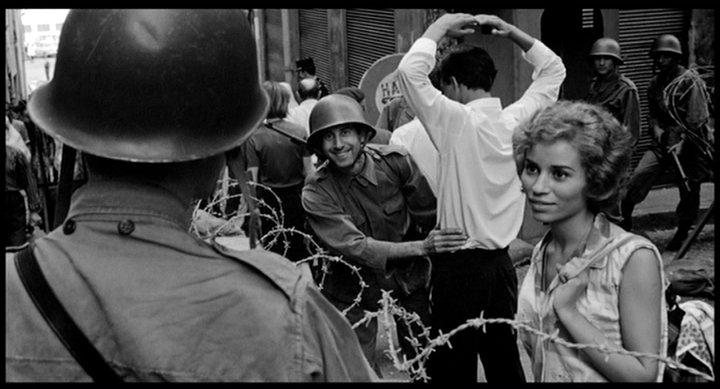The Battle of Algiers is a film that reflects the battles between the FLN and the French. Highly praised for its accurate account of the Battle of Algiers (the battle in the Algerian war of Independence), the movie can arguably be considered a historical documentation of the Algerians struggle for Independence. Pontecorvo’s hyper realistic depiction of Algiers during the late 1950s and early 1960s gives the viewer a look into french colonialism. We are given a lens into how Colonialism affects lives at a microscopic scale in contrast to the typical macroscopic view. We understand there is a war between the French soldiers and Algerians but the depiction of the battle makes it difficult for the viewer to immediately pick aside. Whether it be Colonial Mathieu, Ali la Pointe, or the French settlers, there is a humanistic portrayal of all characters. Rather what is prevalent is colonialism. Colonialism in the movie is a invisible repressive force that affects everyone in the movie. The audience never hears the word or see it we just know that it is the root of most actions in the movie.
All posts by Muhamad Bah
Similarities between Radio Raheem and Eric Garner
Here’s a video that places the death of Radio Raheem and Eric Garner Right next to each other. The Similarities are shocking but it highlights the power of film in ways we do not typically view them in.
Heat
In Spike Lee’s “Do the Right Thing” the Heat plays a significant role. Spike is noted for his inspirations from real life events such as the Howard Beach Incident and the Tawana Brawley rape case. The Idea of a hot summer day in New York city is derived from New York summer’s notorious crime rates. The setting of a hot Brooklyn summer foreshadows that something bad will happen.
In addition, the heat can also be a symbol of Racism. In the movie people constantly complain about the heat and try to find ways to escape it, whether it be through fans, fanning themselves, or ice water. However, it is impossible to get away from the omnipresent heat. The heat symbolizes racism because people may try to escape it or get over it but no matter what is done it still exist. When one may assume that the heat wave would only last one day, Spike furthers the symbolism by keeping the crippling heat for another day. Assuring the audience that racism is still prevalent.
Setting in the opening scene
In the beginning of the film the viewer is aware that the year is 2027 but yet we do not see many futuristic advancements that we would expect to see. Once Theo steps out of the cafe we see that the future looks more torn down than our modern day society. Immediately we realize something is wrong when there is a gloomy setting with litter filled streets, dirty buses, and rickshaws as means for transportation in London. The controversial depiction of 2027 confuses the audience. The confusion helps to set up the dystopia because it contributes to the chaotic nature of a dystopia.
